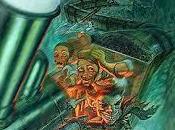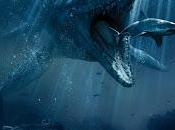Vi presentiamo in esclusiva, in occasione dell’uscita nelle prossime settimane del Blu Ray di Iron Man 3, una intervista a Daniel Gonzalez, Chief Creative Officer di Perception, società specializzata nel design e in animazione che ha lavorato al cortometraggio Agent Carter (interpretato da Hayley Atwell) creandone i titoli di testa e di coda. La Perception ha al suo attivo numerosi lavori per il cinema, avendo collaborato a pellicole quali Iron Man 2, Men in Black 3, The Avengers e il recente Iron Man 3.
Ciao Danny, puoi innanzitutto presentarti ai nostri lettori e parlarci della Perception?
Mi chiamo Daniel Gonzalez, sono il cofondatore e CCO di Perception. Ho fondato Perception nel 2001 con il mio partner Jeremy Lasky. Ho conosciuto Jeremy all’epoca in cui lavoravamo entrambi alla RGA. Perception è uno studio creativo innovativo. Abbiamo cominciato facendo tutto con un G3 e un portatile, da cui abbiamo re-immaginato il modo cui il design e l’animazione erano realizzati e cominciato la desktop revolution. Negli ultimi 12 anni Perception è divenuto uno dei migliori studio di design ed effetti visivi di tutto il mondo. Dagli enormi schermi IMAX fino ai più piccoli dispositivi portatili, l’elenco delle nostre collaborazioni si è via via sviluppato in una prodigiosa raccolta di marchi internazionali, autorevoli agenzie pubblicitarie, network importanti e i più grandi studios cinematografici del pianeta. Abbiamo creato una nicchia nel design tecnologico del futuro, aiutando gli studios a concepire dispositivi futuristici con interfacce interessanti e intuitive. Al momento Perception lavora a stretto contatto con importanti compagnie attive nel settore della tecnologia, per fare la stessa cosa sui loro prodotti di prossima realizzazione. Progettiamo il futuro. 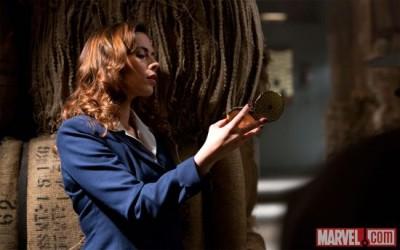
Recentemente avete lavorato al cortometraggio “Agent Carter”. Questa non è la prima collaborazione con i Marvel Studios da parte vostra. Puoi dirci quando siete stati contattati e per quanto tempo avete lavorato al progetto?
La Marvel ci ha contattato a metà aprile. Avevano già in mente un’idea forte elaborata da Sheena Duggal, supervisore degli effetti visivi. Il progetto aveva un po’ di ritardo quindi abbiamo dovuto correre, avevamo poco più di due settimane per completare l’animazione. É stata una repentina inversione di rotta ma ci piace lavorare con la Marvel perché ci lasciano libertà creativa. Abbiamo fatto delle lunghe nottate ma siamo stati tutti felici del risultato e abbiamo avuto finora un feedback ottimo. É fantastico lavorare con i tipi della Marvel!
Quante persone del vostro staff hanno lavorato ad “Agent Carter”?
Abbiamo avuto un massimo di sei progettisti/animatori al lavoro, mentre di norma ci sono state tre/quattro persone che hanno seguito il progetto dall’inizio alla fine.
Per i titoli di testa e di coda del cortometraggio vi siete ispirati a qualche atmosfera in particolare, magari guardando alle vecchie serie televisive del passato, vista l’epoca in cui il corto è ambientato?
Abbiamo lavorato con Sheena per dare vita al suo progetto iniziale. Ci ha fornito la sua grande ispirazione nell’impostare le immagini da quel preciso momento fino alla realizzazione finale. É stato incredibilmente divertente lavorare con lei, cercando le soluzioni più azzeccate per passare da una scena all’altra. Ci è piaciuta molto la collaborazione creativa con la Marvel e abbiamo sempre avuto la sensazione di far parte di un unico team chiamato a raccontare le storie della Marvel.
Quali sono state le principali richieste che avete ricevuto dai ragazzi della Marvel?
Ovviamente la cura per il lavoro per loro è una priorità costante. Sono perfezionisti e chiedono lo stesso livello di attenzione ai loro collaboratori. Mentre lavoravamo su Agent Carter abbiamo valutato scrupolosamente ogni dettaglio, dai colori al ritmo e la velocità dei movimenti della camera.
Inoltre abbiamo realizzato numerosi schizzi preparatori per catturare l’atteggiamento” di Peggy Carter. Di sicuro mentre cercavamo di interpretare le loro direttive ci siamo fatti molte domande. Sappiamo che milioni di persone andranno a vederlo e vogliamo che il risultato sia il migliore possibile nel tempo a nostra disposizione. Continuano a voler migliorare tutti i gadget fighi e la tecnologia presente nei loro film e noi gli siamo riconoscenti per la possibilità di lavorare a questi blockbuster.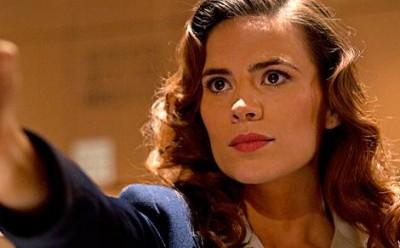
Come già accennato, questo non è il vostro primo lavoro per i Marvel Studios. Puoi dirci quali sono state le differenze principali tra lavorare a questo cortometraggio e pellicole come Iron Man 2 e 3 e The Avengers?
Il programma è una grossa differenza. Di solito abbiamo più tempo per i film più lunghi. Qui si trattava di una sequenza di 70 secondi, cosa diversa dalla realizzazione di numerosi segmenti per un film. Tutto doveva quadrare ed essere perfettamente orchestrato per dare un’idea del corto senza cambiare tono. I titoli erano vivaci quanto il film! Questo era più in linea con la classica animazione che con gli effetti visivi. Nei film più lunghi ci dedichiamo soprattutto alle interfacce e ai regni futuristici.
Quali tecnologie usate per il vostro lavoro? Ce le puoi descrivere?
Carta e penna (mai usate abbastanza), CS, Cinema 4D, Maya, Nuke e un mucchio di sotfware per aiutarci a dare vita alle nostre visioni… Penso che quello che ci differenzia dagli altri studio che usano i nostri stessi strumenti sia il desiderio che ogni film e progetti a cui ci dedichiamo, abbia successo. Il nostro nome accompagna questi progetti assieme a quello dei nostri partner e alla fine del lavoro siamo come una famiglia… Quindi per forza dobbiamo fare del nostro meglio!
Quali sono i vostri prossimi progetti?
Stiamo completando tutte le riprese POV e HUD per il remake di RoboCop. Abbiamo inoltre progettato una newsroom virtuale che sembra davvero molto interessante che dovrebbe essere pronta nel febbraio 2014. Speriamo di lavorare ancora con la Marvel. Abbiamo altre cose in ballo e speriamo di essere coinvolti in alcuni grandi film di prossima uscita. Lavoriamo anche un sacco con grossi marchi tecnologici. Questi marchi si stanno rendendo conto che hanno bisogno di un look innovativo per i loro prodotti. Abbiamo realizzato questi servizi tecnologici futuristici e design per interfacce / interfaccia utente per contesti immaginari e ora li stiamo facendo per il mondo reale. Ci stiamo specializzando nel colmare la distanza tra entrambi i mondi!
ENGLISH VERSION
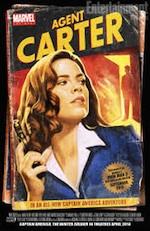
Hello Danny, first of all may you introduce yourself to our readers and tell us about the Perception?
My name is Daniel Gonzalez, I am the co- founder and Chief Creative Officer of Perception. I co-founded Perception in 2001 with my partner Jeremy Lasky. I met Jeremy when we both formerly worked at RGA. Perception is a cutting edge creative studio. We started by doing everything with a G3 and a laptop, from there we re-imagined the way design and animation was crafted and began the desktop revolution. Over the last 12 years, Perception has become one of the top design and visual effects studios in the world. From the biggest IMAX screens to the smallest mobile devices, client collaborations have flourished into a prodigious collection of international brands, prominent ad agencies, major networks and the biggest film studios across the planet. We have created a niche in future tech design, helping film studios create futuristic devices with interesting and intuitive interfaces. Currently, Perception working closely with major technology companies to do the same with them on their devices being released. We design the future.
Recently you have worked on the short film “Agent Carter.” On your part, this is not the first collaboration with Marvel Studios. Can you tell us when you have been contacted and how long have you worked on the project?
Marvel contacted us mid April. They already had a great concept in mind which was concieved by VFX Supervisor Sheena Duggal. The project was a bit behind schedule so we had to hit the ground running, we had a little over 2 weeks to get the full piece animated. It was a quick turnaround but we love working with Marvel because they let us get creative with projects. We had some long nights but everyone was very happy with the outcome and we got some great feedback so far. Its a blast working with all the folks at Marvel!
How many people on your staff have worked on “Agent Carter”?
At its peak we had 6 designer/animators working on it but we had a constant 3-4 that lived the project from start to finish.
For titles and closing credits of the short film did you get inspiration from some atmosphere in particular, maybe watching the old television series of the past, given the age in which the short is set?
We worked with Sheena to bring her initial concept to life. She provided us with some great inspiration from that specific time period along with set imagery from the actual short. It was a ton of fun collaborating with her on clever ways to transition between the different scenes. We love the creative partnership we have with Marvel and always feel like we were all on the same team when it comes to telling the Marvel stories.
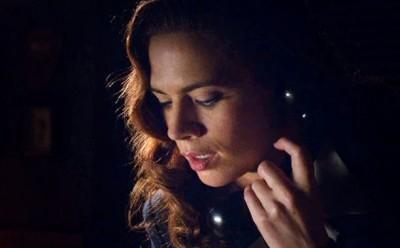
What were the main demands that you have received from the guys at Marvel?
Obviouly security is always a high priority with them. They are perfectionists and demand that same level of care with all who collaborate with them. While we worked on Agent Carter we all looked at every detail from the colors to the pace and speed of the camera moves. We even created multiple drawing styles to capture the Peggy Carter “attitude”. We definitely put heavy demands on ourselves when conceptualizing for them. We know millions of people are going to see it and we want the creative to look as great as we can make it in the time frame we have. They continue to push the envelope on all the cool gadgets and technology in all the movies and we are grateful we get to work on these blockbuster films.
As already mentioned, this is not your first work for Marvel Studios. Can you tell us what were the main differences between this work and movies like Iron Man 2 and 3 and The Avengers?
The schedule is a big difference. We usually get more time for the bigger films. This was a 70 second complete sequence which is different then working on multiple shots for a film. Everything had to line up and be perfectly choreographed giving a tease of the short without changing the tone. The titles were as energetic as the short! This was also more in line with straight motion graphics then VFX. On the bigger films we explore more of the interface and futuristic realms.
Which technologies do you use for your work? You can describe them?
Pencil and Paper (not used enough:) CS, Cinema 4D, Maya, Nuke and a host of tracking and software to help bring our vision to life.. I think somehting that seperates us from every other studio using the same tools is the passion of wanting the film or any project we work on to succeed. Our names go on these projects along with our partners and by the time we finish the project they are like family… So of course we have to make them look great!
What are your next projects?
We are completing all the POV and HUD shots for the remake of RoboCop. We also designed a virtual newsroom that look very interesting so look out for that in Feb 2014. We are hoping to work more with Marvel. We have some others we are pitching on and hope get involved with some great films coming soon. We also do a lot of work with major technology brands. These brands are starting to realize that they need an innovative look for their products. We’ve done these future tech audits and designed interfaces/UI’s for fictional worlds and are now doing them for the real world. Something we are becoming experts on is bridging the gap between both worlds!
Etichette associate:
Marvel StudiosHayley AtwellSheena DuggalDaniel GonzalezAgent CarterIn Evidenza